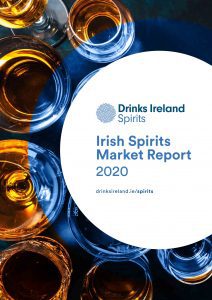Domestic spirits sales declined 4.8% in 2020

Some spirits categories benefited from the consumer shift to the off-trade in Ireland, according to the report.
The report shows that spirits exports from the Republic of Ireland declined by 15.97% last year from €1.18 billion in 2019, to €990 million in 2020. However, this comes on the back of a number of years of strong growth, with the value of spirits exports growing by 83.6% between 2014 and 2019, prior to Covid-19.
Last year’s decline was due in part to the collapse of Global Travel Retail, believes Drinks Ireland|Spirits’ Chairman Bryan Fallon. Prior to Covid-19, it was the second-largest market for Irish whiskey and the fourth-largest for Irish Cream Liqueur. Recovery in this market could be slow, according to the report and will likely go hand-in-hand with international travel returning to pre-pandemic levels.
Domestically, the closure of hospitality venues had a negative impact on the sector, particularly for brands that rely heavily on the on-trade. Overall, sales fell by 4.8%, from 2.42 million 9-litre cases in 2019 to 2.3 9-litre million cases in 2020.
However, some spirits categories benefited from the consumer shift to the off-trade in Ireland, according to the report, with Irish Cream Liqueur sales growing by 26.5%.
Spirits-based Ready To Drink products and Hard Seltzers enjoyed a good 2020 too. As a category Hard Seltzers did not exist in Ireland in 2019, but in 2020 nearly 90,000 cases of various brands were sold.
While sales of vodka declined by 10.2% last year it remained Ireland’s most popular spirits drink, with a 31.6% market share in the category. This was followed by Irish whiskey (26.3%), gin/Irish gin (14.04%) and rum (7.4%).
While sales of gin in Ireland fell by 6.6% between 2019 and 2020, it has seen remarkable growth in recent years, with gin sales up by 184% between 2014 and 2019.
Forecasts for the next five-year period suggest that the growth in gin/Irish gin has not ended, states Drinks Ireland|Spirits, adding that the decline in 2020 will be seen as a Covid-19-related blip.
Excise burden
However, excise rates continue to plague the drinks industry.
Ireland has the third-highest level of excise on spirits in the EU and Drinks Ireland|Spirits has called for a reduction in the upcoming Budget to help drive recovery.
Covid-19 also negatively affected Irish distilleries that host visitor experiences and the return of inbound tourism will be critical in driving recovery here.
“Irish hospitality venues are a vital component to the continued growth and prosperity of Ireland’s spirits and craft spirits sector, allowing companies to engage with consumers, so their closure was very much felt,” said Bryan, the Managing Director of Heaven Hill Ireland, brand-owner of Carolan’s Irish Cream Liqueur and Irish Mist Honey Liqueur, “Despite this, the resilience shown by the spirits sector last year in the face of the loss of one of the main consumer channels was remarkable, with producers responding with an increased emphasis on the off-trade and a focus on e-commerce.
“Outside of Covid-19, a number of other challenges remain such as Ireland’s high level of tax on alcohol which is unsustainable and uncompetitive,” he continued, “We’re calling on the government to reduce excise tax by 7.5% in Budget 2022. An excise reduction would boost post-Covid tourism and secure sustainable, long-term growth for Ireland’s drinks and hospitality businesses in 2022 and beyond.
“While 2020 has shown that our sector is resilient and adaptable, this resilience and adaptability will be tested in the post-Covid world and Government must support in our sector’s recovery through an excise cut.”
Full coverage of this report in our November issue.








